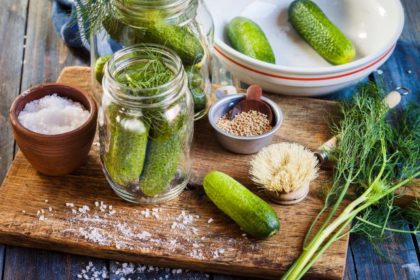
Pickle and yogurt brands are speaking out against new labeling rules proposed by the U.S. Food and Drug Administration. The FDA’s new guidelines say some brands of the fermented products cannot be marketed as healthy because pickles are too salty, while some yogurt has too much sugar.
The guidelines are being updated for the first time since the 90’s. They redefine what can be labeled as “healthy” on a food package. Healthy products have high amounts of key nutritious ingredients, like fruits and vegetables, and low amounts of added sugar, sodium and/or saturated fat. Those updated nutrient content claims would go into effect in 2026. They wouldn’t ban “unhealthy” foods, but prevent the use of “healthy” on a label.
“Pickles have a role to play in a healthy diet because they are predominantly comprised of vegetables and serve as a delicious condiment to other nutrient-dense foods,” Pickle Packers International said in a statement.
Though pickles are made from low-sodium cucumbers, they are either fermented through a brine made of water, salt and seasonings or preserved in a brine of vinegar, salt and seasonings. Without enough salt in the brine, bacteria can grow and spoil the pickles. The new guidelines put the limit for sodium from a vegetable product at 10% of the daily value per serving (230 milligrams per serving). But most pickles include 11% sodium per serving.
Yogurt, too, is under fire. The new guidelines outline that a ¾ cup of yogurt should only include 5% per serving of the daily value of sugar (2.5 grams of added sugar per serving). Chobani’s plain greek yogurt includes 5.5 grams of sugar per serving. Chobani has actively protested the FDA’s ruling, noting that “reducing sugars to the level proposed by FDA for the ‘healthy’ claim would result in significant, deleterious effects to product quality, taste, and texture.”
Other companies are protesting the FDA’s guidelines – like General Mills, Kellogg’s, SNA International, the National Pasta Association and the Consumer Brands Association. The FDA guidelines put tighter restrictions on cereal and pasta, too.
“Hardly anything would qualify, so of course food manufacturers don’t like the idea,” says Marion Nestle, emeritus professor of nutrition and public health at New York University. She told nutrition and medicine publication STAT that the FDA’s regulation “automatically excludes the vast majority of heavily processed foods in supermarkets, as well as a lot of plant-based meat, eggs, and dairy products,” from bearing the healthy claim.
The publication notes nutrition experts gave “overwhelmingly positive remarks.” The new guidelines are supported by the American Society for Nutrition, the Association of State Public Health Nutritionists and the Robert Wood Johnson Foundation. Some experts argued the GDA could go further in restricting the healthy label.
Read more (STAT)
